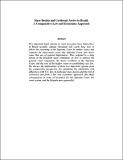| dc.description.abstract |
Two important legal reforms in court procedure have take place in Brazil recently: súmula vinculante (all courts have now to following the reasoning of the Supreme Court in similar cases) and requisito da reprecuassão geral (the Supreme Court only hears cases that are of general importance). They respond to a long debate in the Brazilian legal community on how to address the general court congestion, the heavy workload of the Supreme Court, and the role of the higher courts in establishing case law. We discuss the implications of these two important reforms from the comparative perspective (by explaining the similarities and differences with U.S. law, in particular stare decisis and the writ of certiorari) and from a law and economics approach (the likely consequences in terms of incentives for the Supreme Court, the court system and the litigants more generally). |

